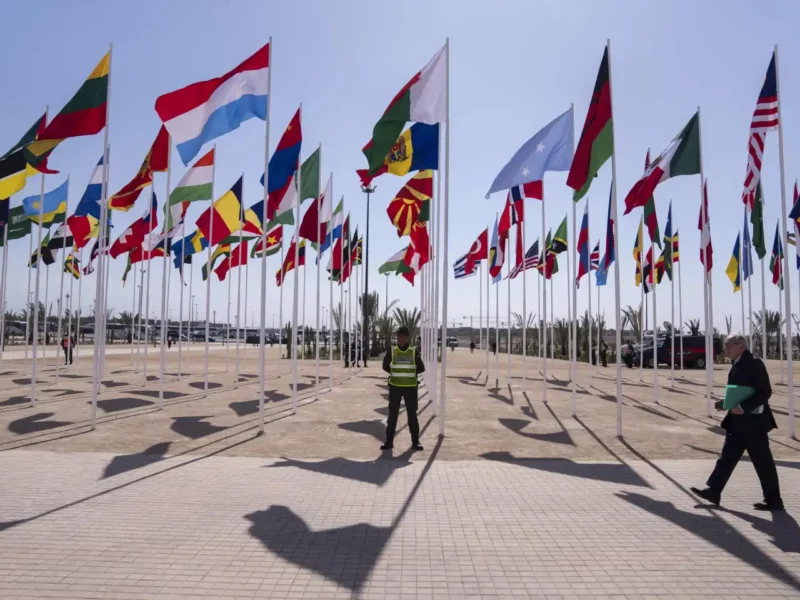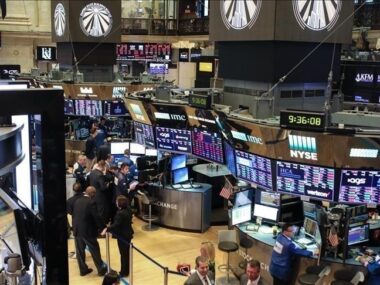The impact of increasing interest rates, the invasion of Ukraine, and widening geopolitical rifts has caused the global economy to lose speed, and now it confronts new uncertainty due to the conflict between Israel and Hamas militants, the International Monetary Fund warned Tuesday.
According to the IMF, from an anticipated 3% this year, global economic growth would decrease to 2.9% in 2024. From the 3% expected back in July, the prediction for the next year has been revised downward.
The globe has yet to recover fully from the catastrophic but brief COVID-19 recession in 2020, and now the Middle East crisis may have an impact, particularly on oil prices.
The epidemic and Russia’s war in Ukraine were only two of the earlier shocks that have reduced global economic production by around $3.7 trillion over the last three years compared to pre-COVID patterns.
IMF head economist Pierre-Olivier Gourinchas stated at a press conference during the organization’s annual meeting in Marrakech, Morocco, “The global economy is limping along, not sprinting.”
The IMF’s forecast of 3% growth this year is unchanged from its predictions from July, although it is down from 3.5% in 2022.
According to Gourinchas, it is “too early” to predict how the recent conflict in Gaza between Israel and the terrorist Palestinian organization Hamas will affect global economic growth. He highlighted that oil prices had increased by around 4% during the previous several days and stated that the IMF was “monitoring the situation closely”.
“We’ve observed that in earlier crises and conflicts. Naturally, this reflects the possibility of an interruption in the region’s oil production or transportation, he added.
According to Gourinchas, a sustained 10% increase in oil prices would have a negative impact on world economic growth of 0.15% and a positive impact on global inflation of 0.4%.
But again, he stressed that it was too soon to draw any conclusions at this point.
As of now, the rise in oil prices has been “fairly muted,” according to Carsten Fritsch, a commodities analyst for Commerzbank. He pointed out that major oil producers Saudi Arabia, the United Arab Emirates, Kuwait, and Iraq have not publicly declared their support for Hamas, making it unlikely that they will curtail production in reaction to the conflict.
Gourinchas noted that the global economy has so far shown “remarkable resiliency,” despite the fact that the U.S. Federal Reserve and other central banks across the world have aggressively hiked interest rates to fend off an uptick in inflation.
The increases helped to reduce pricing pressures without creating many unemployed people. According to him, this combination is “increasingly consistent” with the notion of a “soft landing,” which holds that inflation may be controlled without igniting a recession.
Global consumer price inflation is predicted by the IMF to fall from 8.7% in 2022 to 6.9% this year and 5.8% in 2024.
In the most recent World Economic Outlook from the IMF, which was finished before the conflict between Israel and Hamas broke out, the United States stands out. The IMF revised its estimates for U.S. growth this year to 2.1% (corresponding to 2022), and to 1.5% in 2024 (much higher than the 1% it had forecasted in July).
Oil prices have increased since Russia’s invasion of Ukraine last year and have increased more recently due to Saudi Arabia’s production cuts, but the United States, an energy exporter, has not been as negatively impacted as other countries in Europe and other regions. Additionally, American consumers have been more eager than most to spend their pandemic-related savings.
The 20 nations that share the euro and are particularly vulnerable to rising energy prices are seeing worse conditions. The eurozone’s growth was reduced by the IMF to 0.7% this year and 1.2% in 2024. In reality, it anticipates that the German economy would contract by 0.5% this year before rebounding to increase by 0.9% the next year.
That is even lower than the IMF’s prediction for Russia’s economy, which is that it will grow 2.2% this year before contracting to 1.1% growth the following.
The IMF has revised its growth projections for China’s economy, the second largest in the world, down to 5% this year and 4.2% in 2024.
After the communist government lifted harsh “zero-COVID” lockdowns that had stymied growth in 2022, analysts predicted that China’s economy would recover this year. However, the nation is having issues with an oversaturated housing market.
The IMF once more voiced concern that the world’s nations were forming geopolitical blocs that might restrict global commerce and economic growth.
As tensions with Beijing rise, the United States and its allies have placed previously unheard-of sanctions on Russia in response to its invasion of Ukraine and have worked to reduce their reliance on Chinese imports.
The IMF said that roughly 3,000 new trade restrictions were adopted by nations last year, up from less than 1,000 in 2019. In contrast to the 4.9% yearly average from 2000 to 2019, it predicts that international trade would only rise by 0.9% this year and 3.5% in 2024.











